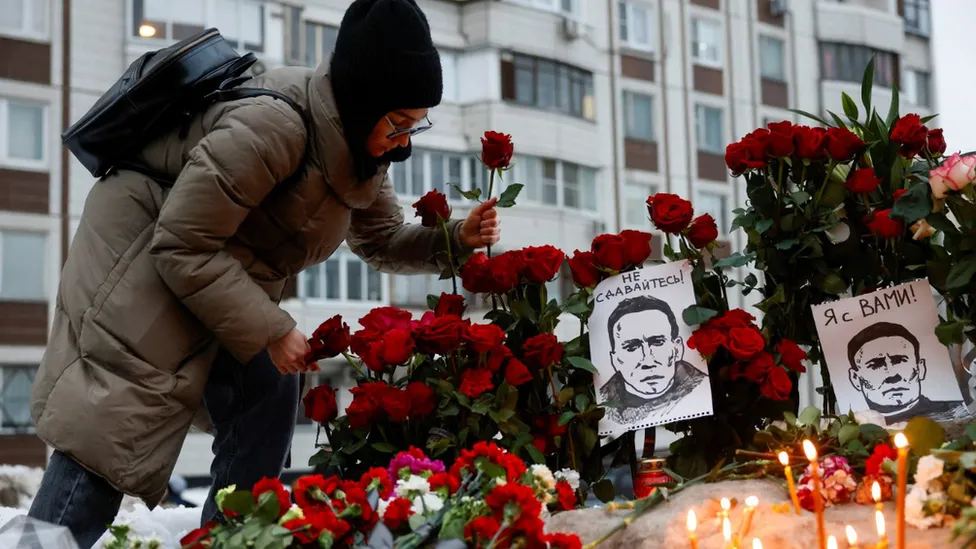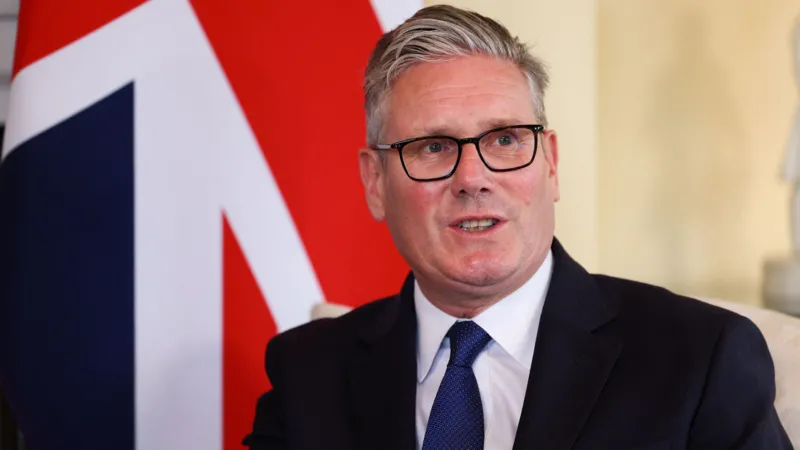Steve Rosenberg: What Navalny's funeral tells us about Russia today
We witness events, and we report on them. But in the age of 24-hour news, there is often precious little time for journalists to pause, take breath and take in the magnitude of what has happened.

In the hours after Russia's full-scale invasion of Ukraine on 24 February 2022, I was filing non-stop for TV, radio and the BBC news website.
Only at 2am the following morning, after my last TV live of the day, could I stop and try to compute the enormity of the moment. It has been the same with Alexei Navalny.
For two weeks I have been reporting on the death of Russia's most prominent opposition leader in an Arctic penal colony.
I talked about the problems his family had encountered as they tried to recover his body; I spoke to Muscovites laying floral tributes to him.
On Friday I watched Navalny's coffin being carried into a Moscow church. I saw thousands of Russians lining up to pay their final respects.
I saw his supporters throw roses and carnations at the hearse before it headed to the cemetery.
But only once I'd seen the dramatic images of his coffin being lowered into the grave did Navalny's death finally, fully, hit home.
Today the tributes continued, as Russians - including Navalny's mother Ludmila - came to Borisov cemetery and laid flowers at his grave.
I've been thinking about the extraordinary scenes I witnessed yesterday and about what they tell us - if anything - about Russia today.
Considering the current wave of repression against dissenting voices, it was unclear how many Russians would come out to say goodbye to the Kremlin's staunchest critic.
A steady stream of people laid flowers on Navalny's grave at Borisovskoye cemetery
In recent days hundreds of people had been detained by police across Russia at events commemorating Navalny.
But, thousands came.
When I talked to people, young and old, queuing outside the church, they spoke of the hope Navalny had given them of a better, brighter future for their country.
They spoke in support of freedom, democracy, and peace.
Later, the crowds chanted the kind of slogans unheard on Russian streets since the invasion of Ukraine, such as "Freedom to Political Prisoners!" and "No to war!"
It struck me, here was a Russia who had been absent from public view for two years; a Russia which does not support Vladimir Putin, or the war in Ukraine, and wants to be a democratic country.
It stands in complete contrast to the Russia shown on state TV: Russia is rabidly anti-Western, pro-Putin, full-square behind the "special military operation" in Ukraine and embracing authoritarianism at home.
The question I'm left with is this: were yesterday's scenes the dying embers of liberal democracy in Russia, a "last hurrah" for freedom of expression before it is extinguished completely?
Those in power here may well believe so.
Russians gathered to try to pay respects to late Russian opposition leader Alexei Navalny during his funeral
They've certainly been working hard to achieve that, adopting repressive laws designed to silence and punish dissent.
As a result, Russia's most high-profile opposition figures have either fled abroad or are in prison at home.
With the death of Navalny, the opposition has lost its most charismatic leader.
In two weeks time, President Putin will face no serious challenge in Russia's presidential election - his fiercest critics are not on the ballot.
After what is expected to be declared a "landslide" victory, the authorities will portray President Putin and his policies as super popular and dismiss his critics as a tiny minority of the Russian public.
But, here's the thing. Very often Russians who vote for him tell me they do so not because they're excited by his policies or his vision of Russia: they simply see no alternative.
That's exactly what the Kremlin has sought to achieve by removing all serious rivals from the political stage.
What I saw on the streets of Moscow, on the day of Mr Navalny's funeral, was very different: a genuine outpouring of support for a politician who had inspired a section of the Russian public with an alternative vision for Russia.
Mr Navalny is dead. But for these people, their desire for a different Russia is very much alive.
-bbc






